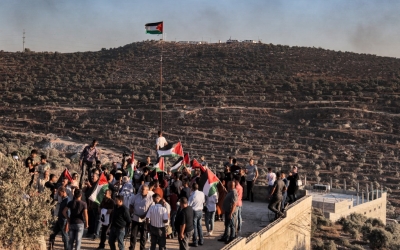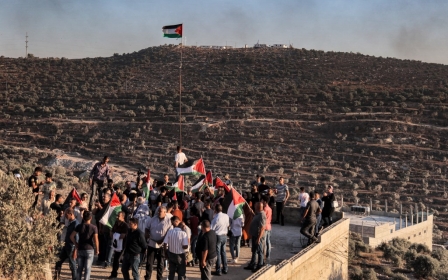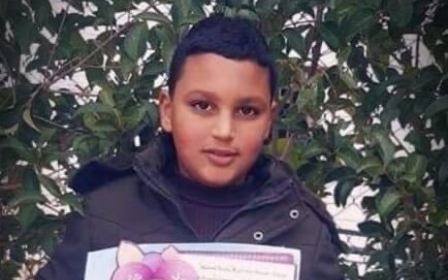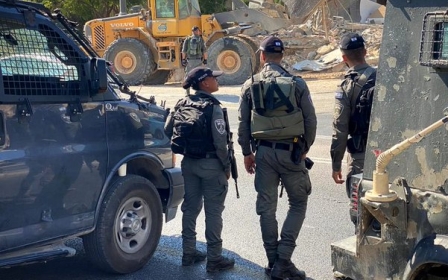Israel demolishes buildings near Hebron and vows to 'purge' Palestinian Bedouins
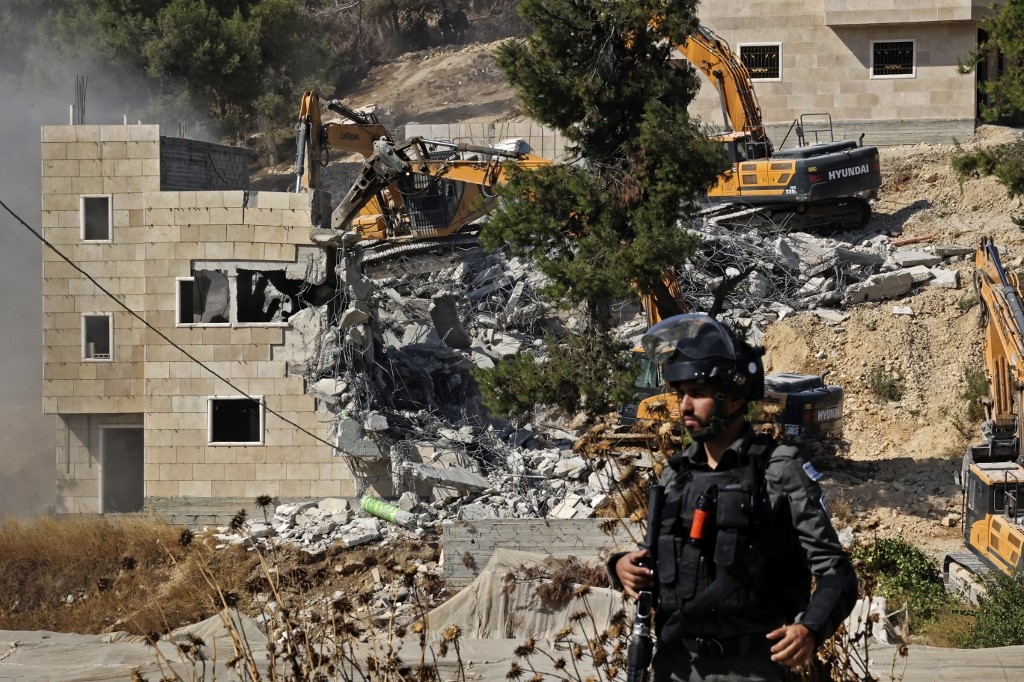
Israeli forces demolished several Palestinian houses and agricultural premises in the occupied West Bank on Thursday, in a move condemned by the Palestinian Authority (PA) as an "ethnic cleansing operation".
Israeli bulldozers razed two residential buildings belonging to the Jaradat family in Sair, a town near Hebron city. At the same time, Israeli forces used batons and shot tear gas and rubber-coated bullets to disperse Palestinians who protested the demolition.
A Palestinian was hit by a bullet in the abdomen, and several suffered from suffocation caused by tear gas, the Palestinian Wafa news agency reported.
'The families were preparing to move in and were finalising the necessary legal papers... but the Israeli army decided to raze it before completing the procedures'
- Fathy Abdul Aziz, councillor
Several Israeli military vehicles and four bulldozers arrived at the Wadi al-Sharq area in Sair on Thursday morning. They started a nearly four-hour levelling operation of two residential buildings.
Each building has three flats of 200 square metres.
At the time of the demolition, Jaradat's residential buildings were in their final stages of construction, Fathy Abdul Aziz, the head of Sair council, told Middle East Eye.
"The families were preparing to move in during the upcoming months, and they were finalising the necessary legal papers to get building permits for the flats, but the Israeli army decided to raze it before completing the procedures," Abdul Aziz said.
Israeli forces arrested the owners of the buildings, Ahed and Jamal Ali Yasin Jaradat, two brothers, and assaulted the residents - including children and women - with batons, while shooting tear gas canisters and stun grenades at Palestinians from Sair who attempted to block them from reaching the site.
Abdul Aziz added that the houses are located in Israel-administered Area C, which comprises 60 percent of the West Bank, and that other homes in Sair could face demolition in the future.
"Sair's residents send a message to the [Israeli] occupation that they will remain in their lands no matter how many times their houses are demolished, and they will never leave," he told MEE.
Israel has adopted a policy of demolitions against Palestinian structures in Area C, for building without permits while also clamping down on internationally funded humanitarian projects in the area.
The country has built almost 230 settlements in Area C - in violation of international law - since it first began occupying the West Bank and East Jerusalem in 1967. Some 400,000 Israeli settlers live in Area C, as do 300,000 Palestinians living in 532 towns and villages.
While Israel carries out a settlement expansion policy in the West Bank and East Jerusalem, it makes it nearly impossible for Palestinians to obtain permits to build in East Jerusalem and Area C.
'Purge' of Bedouin community
In eastern Ramallah, Israeli forces also destroyed housing tents and animal sheds and confiscated agricultural equipment from the Palestinian Bedouin community of the Kaabneh clan in the al-Muargat area.
Ghaleb al-Kaabneh told MEE that Israeli forces arrived at the area at 11am local time, and destroyed a tent and a house made of tin, belonging to Odeh Mahmoud al-Kaabneh and Mohammed Suliman al-Kaabneh.
He said Israel had launched a demolition campaign against dwellings belonging to Palestinian Bedouins in Area C in June and had uprooted an entire community of four families.
Kaabnehs have lived in the area for the past 70 years and rely on shepherding between the cities of Ramallah and Jericho as a source of income.
"The Israeli army also targets the water wells during the demolition operations to force us to leave the area," Kaabneh told MEE. He said that Israeli settlers continuously harasses their community, which led them to form a night committee to guard their families.
"No one talks to the settler and holds him to account for his assaults... on the contrary, he calls the Israeli police to come and arrest us and threaten us."
He said a senior employee in the Civil Administration, an Israeli department within the Ministry of Defence running the West Bank, had told him that the area will be "purged" of Palestinian Bedouins in the upcoming months.
"We have nothing but to remain steadfast in the place, and we'll not leave... All that we ask is for the Palestinian Authority and the international community to stand with us and stop our expulsion and we call media to expose what Israel does to us."
'A real battle'
During his tenure as Israeli defence minister in 2020, Prime Minister Naftali Bennett said that his country was launching "a real battle" in Area C, which he said should be annexed.
"Our objective is that within a short amount of time," Bennett said in January 2020, that "we will apply [Israeli] sovereignty to all of Area C, not just the settlements, not just this bloc or another." He also vowed to cease Palestinian construction in the area.
On Thursday, the PA's Ministry of Foreign Affairs said that Israel had been on a demolition spree in the past two days that amounted to an "ethnic cleansing."
On Wednesday, almost 20 business premises and agricultural facilities in the occupied West Bank and East Jerusalem were demolished. These were mainly in Area C, including in Hizma, Wadi Rahaal, and Khirbet Ibzaiq.
"Israel blatantly defies the world and continues to escalate demolitions, razing and seizing Palestinian land on a large scale without legal deterrence or punishment," the PA's Ministry of Foreign Affairs said.
It added that Israel's targeting of economic and agricultural premises aimed to push Palestinians out of the land and impose "de facto annexation" in Area C.
"[This is a] new evidence that Israel, as an occupying power, continues to implement its expansionist colonial projects at the expense of the land of the state of Palestine and its eternal capital, Jerusalem," the PA said.
On Thursday, Israel demolished Al-Araqib, a Palestinian Bedouin community in the Negev desert inside Israel, for the 191st time.
Middle East Eye propose une couverture et une analyse indépendantes et incomparables du Moyen-Orient, de l’Afrique du Nord et d’autres régions du monde. Pour en savoir plus sur la reprise de ce contenu et les frais qui s’appliquent, veuillez remplir ce formulaire [en anglais]. Pour en savoir plus sur MEE, cliquez ici [en anglais].


